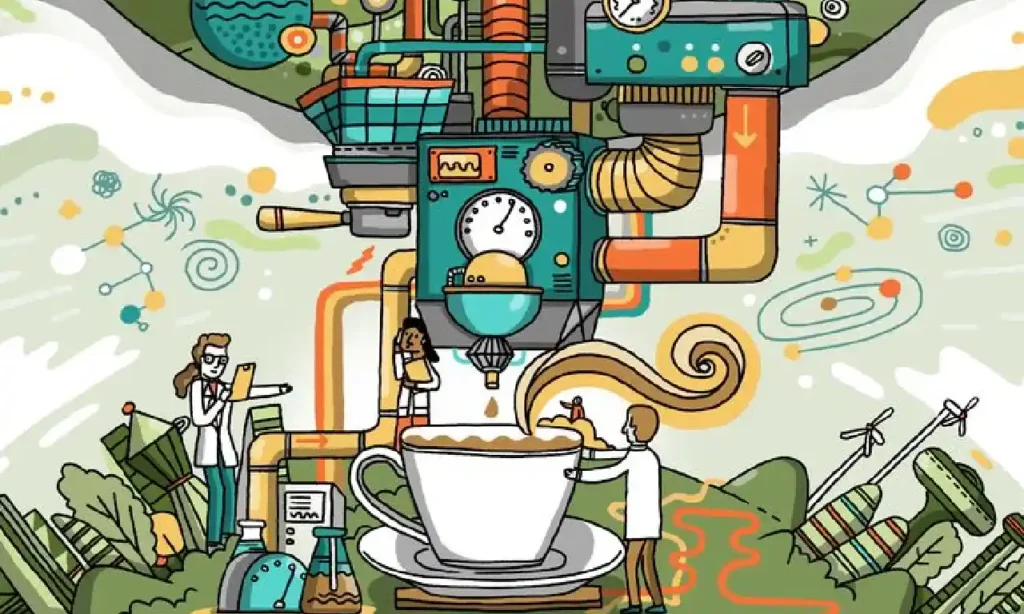“Why You May Soon Be Drinking Synthetic Coffee” In the ever-evolving landscape of culinary innovation, one trend poised to revolutionize our morning ritual is the emergence of synthetic coffee. While the notion of sipping on a cup of coffee brewed from laboratory-created beans may seem like a concept from the realm of science fiction, advancements in food technology are rapidly transforming this idea into a tangible reality. As we delve into the factors propelling the rise of synthetic coffee, it becomes increasingly apparent that our morning brew may soon undergo a profound transformation.
Synthetic Coffee A Sustainable Alternative:
With the world consuming two billion cups of coffee daily, the demand for a sustainable alternative is imminent. Your traditional morning brew, often a contributor to social and environmental concerns, is undergoing a transformation as synthetic coffee emerges. Globally, the consumption of coffee reaches staggering heights, requiring relentless production from an average of 20 coffee trees per daily two-cup drinker, given the modest yield of one to two pounds of coffee per year per Arabica tree.
The Quest for Sustainability:
At the forefront of the drive towards synthetic coffee lies the imperative of sustainability. Traditional coffee cultivation is often associated with deforestation, habitat destruction, and significant carbon emissions. Moreover, fluctuating weather patterns exacerbated by climate change pose a formidable threat to coffee crops, leading to erratic yields and jeopardizing the livelihoods of millions of farmers worldwide. By harnessing the power of biotechnology to produce coffee beans in controlled environments, synthetic coffee offers a sustainable alternative that circumvents the environmental challenges plaguing traditional coffee production.
Consistency and Quality Control:
One of the inherent challenges of traditional coffee cultivation is the variability in flavor profiles and quality arising from factors such as soil composition, climate conditions, and farming practices. Synthetic coffee, on the other hand, offers the promise of unparalleled consistency and quality control. By meticulously engineering the genetic makeup of coffee beans, scientists can fine-tune parameters such as flavor, aroma, and caffeine content with precision, ensuring a standardized product that meets consumer expectations with every sip.
Mitigating Supply Chain Vulnerabilities:
The global coffee industry is inherently vulnerable to supply chain disruptions stemming from geopolitical instability, natural disasters, and socioeconomic factors. Synthetic coffee presents an opportunity to mitigate these vulnerabilities by decentralizing production and reducing reliance on traditional growing regions. By cultivating coffee beans in controlled environments closer to consumer markets, synthetic coffee offers the potential to enhance supply chain resilience and ensure a steady and reliable flow of coffee to meet global demand.
Catering to Evolving Consumer Preferences:
In an era characterized by an increasing emphasis on health, sustainability, and ethical consumption, consumers are gravitating towards products that align with their values and lifestyle choices. Synthetic coffee has the potential to cater to these evolving preferences by offering a product that is free from pesticides, contaminants, and the ethical concerns associated with conventional coffee production, such as child labor and exploitation. Additionally, the customizable nature of synthetic coffee allows for the creation of innovative flavor profiles and functional beverages tailored to meet the diverse tastes and preferences of modern consumers.
Overcoming Regulatory Hurdles:
While the prospects of synthetic coffee are undeniably tantalizing, the road to widespread adoption is not without its challenges. Regulatory frameworks governing the production and sale of food products vary across jurisdictions, necessitating comprehensive safety assessments and approval processes for synthetic coffee. Moreover, consumer acceptance and perception of synthetic coffee will play a pivotal role in shaping its trajectory, highlighting the importance of transparent communication and education regarding the benefits and safety of this emerging technology.
Conclusion: A Brewing Revolution
As we peer into the future of coffee consumption, “Why You May Soon Be Drinking Synthetic Coffee” the emergence of synthetic coffee stands as a testament to human ingenuity and our relentless pursuit of innovation. While traditionalists may view this development with skepticism, the potential benefits in terms of sustainability, quality, and resilience are too compelling to ignore. Why You May Soon Be Drinking Synthetic Coffee: Whether you embrace synthetic coffee as the next frontier of coffee culture or remain loyal to your favorite brew, one thing is certain – the landscape of coffee consumption is undergoing a profound transformation, and the aroma of change is in the air.

